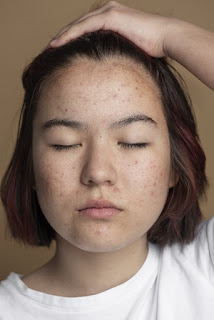Fight Acne, Sun Tan and Hyperpigmentation with these Effective Beauty Practices
There are multiple skin issues like acne, sun tan, and hyperpigmentation that can affect our confidence and overall well-being. These skin concerns are not uncommon, and they can be caused due to various factors, including genetics, hormonal imbalance, unhealthy diet, lack of hydration and sun exposure. With an effective skincare routine and a healthy lifestyle while being consistent with it , you can definitely fight these issues and achieve a flawless complexion. In this article, we will explore some effective beauty practices to help you tackle acne, sun tan, and hyperpigmentation.
Acne is a common skin issue that affects people of all ages but mostly seen in adolescents and people in their 20s. It can be caused by clogged pores, excess oil production, hormonal changes, and even certain dietary habits.The first step in treating and healing acne is maintaining clean and clear skin. Use a gentle, sulphate-free cleanser to remove dirt, oil, and makeup layers without over-drying your skin and stripping off the moisture from your skin. Cleansing should be a part of your daily skincare routine, especially in the morning and evening.These days it is often suggested to opt for double cleansing for better results.
Exfoliation is necessary to unclog pores and remove dead skin cells. You can use physical exfoliants like scrubs, but be gentle to avoid skin irritation. Chemical exfoliants containing salicylic acid or glycolic acid are also effective for acne-prone skin. Limiting exfoliation to 2-3 times a week is a healthy practice. The next requirement is to fight the spots that acne leave behind. Spot treatments with ingredients like benzoyl peroxide or salicylic acid can help target individual blemishes. Apply them directly to the affected areas as needed, but be cautious not to overuse, as it may lead to dryness or irritation.
It is essential to keep your skin hydrated. Use a lightweight, oil-free moisturiser suitable for your skin type to maintain balance. Dehydrated skin can produce more oil and exacerbate acne.It is always good to drink 8 glasses of water to keep yourself hydrated from within which will finally reflect on the skin.
Read Also : Dietary Tips For Stronger And Healthier Hair
Always use sunscreen, even if you have acne-prone skin. Sun exposure can lead to post-inflammatory hyperpigmentation (dark spots) and make acne scars more noticeable. Choose a non-comedogenic, broad-spectrum sunscreen with at least SPF 30.Maintain a balanced diet with fruits, vegetables, and lean proteins. Avoid excessive consumption of sugary and oily foods, which can trigger acne. Additionally, manage stress levels through relaxation techniques, as stress can accelerate breakouts.
Sun tanning and burns can cause your skin to darken and result in premature ageing. Shield your skin against the sun's harmful UV rays and work on reversing sun damage.Prevention is always better than cure. Apply sunscreen before going outdoors in the sun and reapply it every two hours if you sweat a lot. Choose a broad-spectrum sunscreen with SPF 30 or higher for optimal protection. Wear sunscreen even on winters and cloudy days.Wearing sun-protective clothing, such as hats, long sleeves, and sunglasses, can help protect your skin from harmful UV rays.Products containing ingredients like vitamin C, niacinamide, and licorice root extract can help fade sun-induced dark spots and promote an even skin tone. These ingredients inhibit melanin production, which causes skin pigmentation.If you're looking for more immediate and effective results, consult a dermatologist or skin care professional for treatments like chemical peels or laser therapy.
Hyperpigmentation is the overproduction of melanin, resulting in dark spots or patches on the skin. It can be triggered by sun exposure, hormonal changes, and inflammation.
Sun protection is essential to prevent dark spots from worsening. UV rays can trigger melanin production, causing hyperpigmentation. Apply sunscreen every day and include products hydroquinone, alpha hydroxy acids (AHAs), or Kojic acid into your skincare routine which can help to fade dark spots over time.
Retinoids, including over-the-counter retinol and prescription-strength retinoids like tretinoin, can help improve skin texture and fade hyperpigmentation. Start with a lower concentration and gradually increase usage to prevent irritation.Vitamin C is a potent antioxidant that can reduce the appearance of dark spots and even out skin tone. Use a vitamin C serum in your morning routine for best results. Chemical peels administered by a dermatologist or skin care professional can help exfoliate the top layer of skin, reducing the appearance of dark spots and improving skin texture.


.png)
Comments
Post a Comment